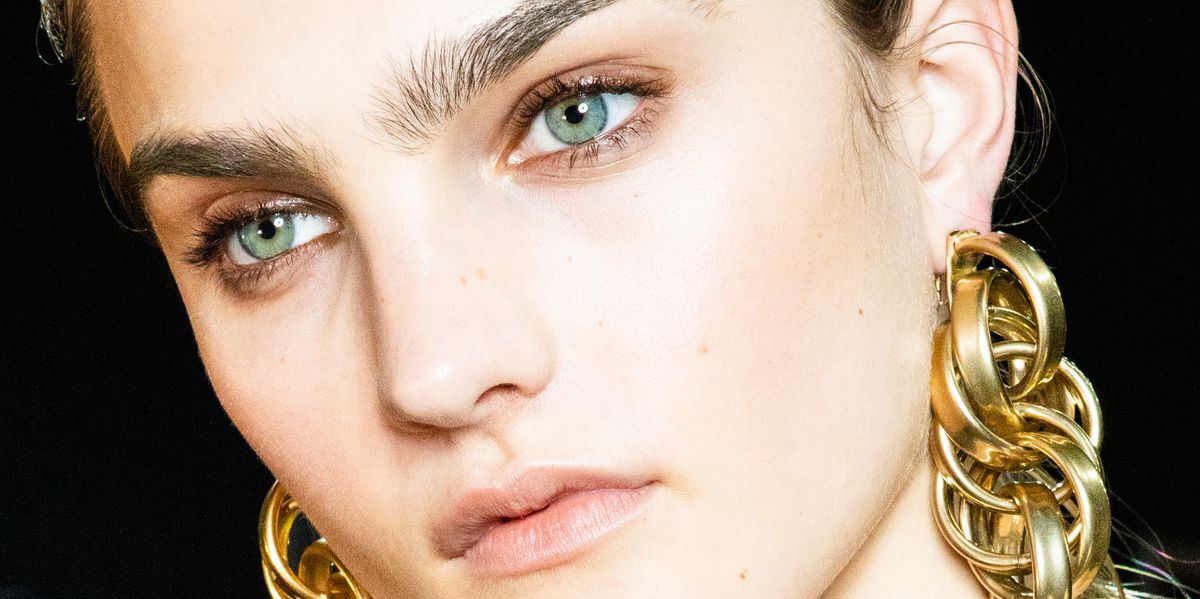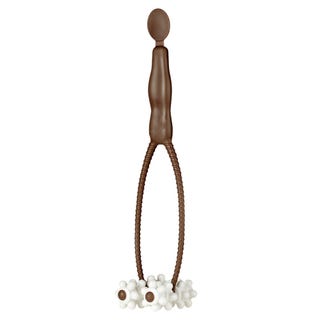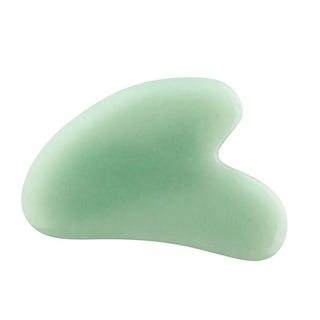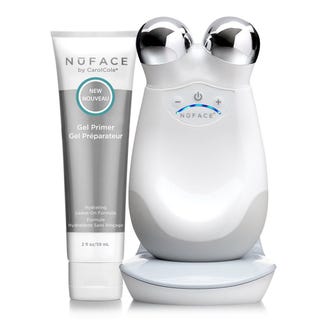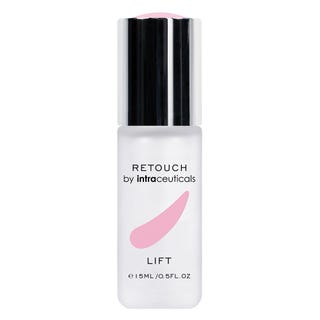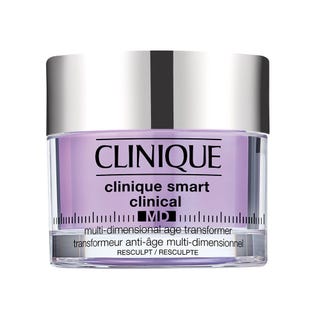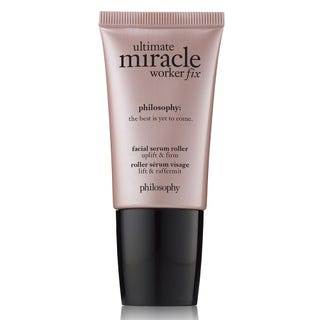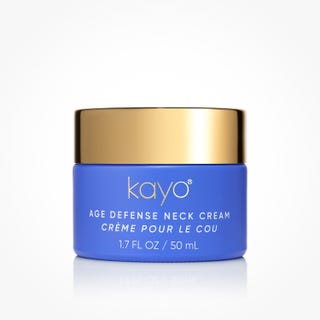According to NYC-based plastic surgeon Dr. Melissa Doft, the number of submental liposuctions (a.k.a. getting the fat removed from around you chin) has tripled since COVID-19 restrictions have allowed her to open her office. “Initially, it was more of an add on procedure [in addition to a primary treatment], but now many women are presenting for it as the sole procedure,” says Dr. Doft.
“For some patients, it has been a procedure that they have considered for a long time and now that they are working from home, they are no longer afraid of the down time of having bruises,” explains Dr. Doft. “Many site the recent increase in Zoom and FaceTime conferences. I think COVID-19 has given us a time to self-reflect on what areas of our bodies we are now ready to change.”
While chin liposuctions cost around $4,000 when performed in Dr. Doft’s office under local anesthesia, there are more options for sculpting the jawline now more than ever. Ahead, Cheryl Wischhover talks to dermatologist Dr. Ava Shamban, GoodSkin clinics founder Lisa Goodman, and plastic surgeon Dr. Lara Devgan about all the ways to chisel a jawline from the gods.
When New York City–based writer Alix Tunell turned 28, she treated herself to a cosmetic procedure she’d been considering for years. “My chin was weak, and I had two little fat pockets [hanging from my jawline]that I would constantly edit out of photos as soon as Facetune became available,” she says.“I just felt my side profile wasn’t strong.” So she visited a well-regarded plastic surgeon on the city’s Upper East Side and, under sedation, had the fat removed with liposuction. In the months following, she’s had doctors use advanced Botox and filler techniques, off-label, to continue sculpting that elusive photogenic mandible. Her results are subtle but fit the bill.“I don’t really Facetune it as much anymore,” Tunell says. “And I don’t feel like I need to work on my angles so much in photos.”
While getting any of these treatments pre-thirties may seem objectively young, Tunell is not alone in her fixation on the area once reserved for chiseled actors and Disney princes. Ava Shamban, MD, an L.A.-based dermatologist and assistant clinical professor of dermatology at the UCLA-Geffen School of Medicine, says the jawline is the hot area in aesthetics right now. “Part of that has to do with the fact that we’ve corrected so many of the other issues,” she says. Now that everyone has smoothed their frown lines and filled their smile lines, we’re looking lower down on our faces. The trend is now so mainstream that major injectable companies have invested millions to get their products FDA-approved for the area, though doctors have been using them off-label for years for this purpose.
This content is imported from Instagram. You may be able to find the same content in another format, or you may be able to find more information, at their web site.
Botox’s manufacturer, Allergan, is seeking FDA approval to relax masseter muscles (chewing muscles that can make the jaw look boxy) and platysmal bands (neck cords that can pull down the jawline). It also produces Juvéderm Volux, a new hyaluronic acid filler with a thicker consistency specifically formulated for the jawline and chin. Volux was approved in the UK and some other parts of Europe and should eventually hit the U.S. Allergan also plans to start studies using its fat-dissolving injectable Kybella in the jowls (it’s already approved for under the chin), and its competitor, Merz, is conducting studies on its Radiesse filler for the jawline.
The causes of what Shamban calls a “jeck”( jawline plus neck) tend to vary by age. In younger women, it’s due to a lack of bone or volume underlying the midface, jawline, or chin. In older women, the same condition is caused by the breakdown of elastin and loss of fat and bone. Facial tissue isn’t supported structurally, and it manifests as the dreaded jowls, loose skin under the chin and on the neck, and a less-defined jawline.
But it’s a much trickier area to address because of its location and anatomy, which is rich in nerves and blood vessels. Treatment usually involves multiple approaches at once, like lasers, tightening with heat, and injectables—plus a healthy dose of realistic expectations. A neck lift or facelift after 50 is still the gold standard. Regardless, an experienced doctor or practitioner is a must.
If you go the injectables route, filler is the workhorse, often used in the midface or outer edges of the face before the jawline itself. For instance, “there’s a large fat pad toward the ear. When it deflates, it causes the face to sink in or fall forward,” says Lisa Goodman, a physician assistant and the founder of GoodSkin clinics in L.A. and New York. After treating these neighboring zones, filler is injected deep into the dermis along the jawbone only if needed.
This content is imported from Instagram. You may be able to find the same content in another format, or you may be able to find more information, at their web site.
As for which filler exactly, it will depend on the results you expect—and how quickly you want them. Juvéderm Voluma XC and Restylane Lyft are hyaluronic acid–based, which means they can be reversed, but are temporary, lasting between one and two years. Radiesse, made of calcium hydroxylapatite, isn’t immediately reversible but can stimulate collagen production for firming that lasts up to 18 months. All these fillers are similarly dense—best for the jaw area—and all can give fast results. Filler generally costs $1,000 to $1,300 per session.
Removing fat below the chin and in the jowls is another way to slim the face and make the jawline pop. Ultherapy and Kybella, which use ultrasound and a fat cell–killing chemical, respectively, are both approved for use on a so-called double chin. But some doctors question their utility on more than a tiny amount of laxity, as they might not be aggressive enough to effect bigger changes. (Also, Ultherapy and Kybella can both be expensive, starting at $1,000 for Kybella and $2,500 for Ultherapy.)
This might be when a plastic surgeon steps in for liposuction or removal of the buccal fat pad, a walnut-size bump in the lower cheeks. The buccals “hang down in the jowly area. Imagine a hound dog or a really chubby infant,” says Lara Devgan, MD, a plastic surgeon in New York City who demonstrated the 15-minute procedure on her Instagram recently, deeming it #oddlysatisfying. Buccal fat removal involves a tiny incision in the mouth and requires little downtime. “It’s a popular procedure among the celebrity and model set because it creates a more chiseled-looking face,” Devgan says. “There are no visible scars, and no one will ever know you did it.” Below-the-chin liposuction and buccal fat removal cost anywhere from $8,000 to $12,000, but results are permanent.
Possibly the biggest innovation for the jawline in recent years is an update on an old technology: dissolvable threads that can be woven under your skin, lifting up your jowls like an internal marionette, with results lasting from one to three years. There are two types of threads FDA-approved for lifts, which are similar to the dissolvable sutures used in surgeries. Internal barbs or cones along the threads lock them in place, and the treatment can potentially stimulate collagen, ostensibly offering both immediate and long-term lift. It costs around $3,000 and up for a treatment.
This content is imported from Instagram. You may be able to find the same content in another format, or you may be able to find more information, at their web site.
But, as one might expect when you picture such a treatment, complications can be troublesome and results so unimpressive that there is now a stark division among experts about whether they should be used at all. “I think that thread lifts are totally overblown and that they don’t work or create a lasting effect,” Devgan says. A 2018 study in AestheticSurgery Journal found that 34 percent of a 160-patient cohort experienced some sort of complication, ranging from redness to the threads becoming displaced.
Goodman says threading is extremely popular at GoodSkin. But, she acknowledges, “It is maybe the most technique-dependent result ever. We’ve had every issue you can have with them and learned the hard way, then sought out training from Korean plastic surgeons.” She says that her clinic’s thread type and technique, which involves fixing the threads to the scalp, can last for a year or longer.
Choosing threads does take some gumption. In 2017, a woman reportedly fainted in the audience after watching a demo of the jaw-dropping (ahem, jaw-raising) procedure at the first Goop conference in L.A. Not an unfair response. As far as Tunell’s further pursuit of a sharper profile: “I feel like I’ve finally reached the end of the line with this.”
This story appears in the September 2019 issue of ELLE.
This content is created and maintained by a third party, and imported onto this page to help users provide their email addresses. You may be able to find more information about this and similar content at piano.io
